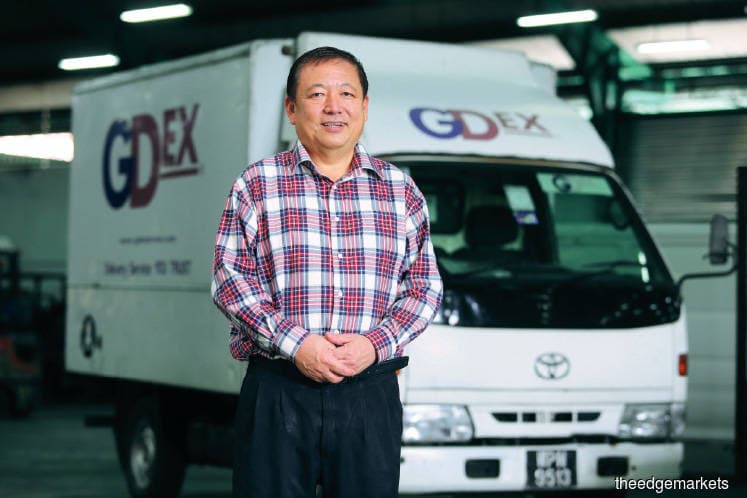
This article first appeared in The Edge Financial Daily on December 9, 2019
KUALA LUMPUR: Compressed margins are set to continue to follow GD Express Carrier Bhd (GDEX) in its financial year ending June 30, 2020 (FY20).
Speaking to The Edge Financial Daily after the group’s annual general meeting last week, managing director (MD) and group chief executive officer (CEO) Teong Teck Lean said while “the trend [for profitability] is still there”, margin squeeze is yet to abate in the face of aggressive competition and pricing, while costs climb with wage increases and more investments needed for network development.
“In this financial year, the pressure will still be there, because one thing is that in terms of costs we have a lot of pressure, because of items such as the minimum wage.
“And compliance is important, and we [also] have to pay incentives [and] overtime. There is also [more] competition, with more new players coming in, and with more aggressive pricing,” he noted.
The group’s push for regional expansion, which started with Indonesia and Vietnam, is also pushing up costs. This is in addition to its investments in new systems and features — where it is spending more than previous years, said Teong.
For these and more, the group has set aside RM30 million as capital expenditure (capex) for FY20. Still, the capex spending is less than the record RM50 million it set aside for FY19. Meanwhile, for the first quarter ended Sept 30, 2019, the group’s net profit shrank 26.44% year-on-year to RM4.47 million from RM6.47 million in the corresponding quarter last year.
The lower bottom line was attributed to investments made in human capital to build a stronger regional team, IT and infrastructure investments, as well as increasingly intense competition that had forced it to lower prices to win market share.
The decline in profit came despite a 11.45% growth in revenue to RM83.04 million from RM74.51 million, which was driven by demand for courier services in the business to business and business to consumer segments.
According to the group’s annual report, GDEX’s cash and bank balances have declined 7.9% to RM30.06 million as of end-FY19, from RM32.64 million in FY18, while its deposits with licensed banks fell 6.4% to RM237.44 million from RM253.64 million.
On the decline in cash position, Teong said it was due to investments made for its operations, and GDEX’s acquisition of a warehouse and e-commerce hub in Kuching, Sarawak. “This [trend of investing] will continue for a while, but I think the cash flow should be able to come back in the immediate term in the next couple of years. In terms of cash flow, it is a very healthy cash flow, it is just that we are investing in a lot right now,” he added.
In terms of free cash flow, Absolutely Stocks noted it fell to RM9.44 million in FY19 from RM28 million in FY18. To this, GDEX executive director and advisory division chief investment officer Jerry Lee said the group is transitioning to a more web-based model, to cut capex. “The traditional way involves us opening a branch, getting trucks in, and can easily cost us on average RM200,000 to RM300,000 per branch opened,” Lee said.
In terms of further expansion, Lee said it will be within Asean, with the potentials being Thailand, the Philippines and Cambodia, if there are opportunities. The mode of entry will likely be similar to GDEX’s expansion into Indonesia and Vietnam, where the group worked with local partners to establish their presence.
GDEX currently has presence in both Vietnam and Indonesia. In Vietnam, the group signed a share sale agreement to acquire No Bai Express and Trading JSC (Netco) on Oct 15 for RM13.85 million.
As for Indonesia, it owns a 44.5% stake in PT SAP Express (SAPX), which is primarily in the express delivery segment, besides transportation, distribution and warehousing. SAPX’s revenue jumped 72.1% for the cumulative nine months ended Sept 30, 2019 to 274.91 billion rupiah (RM81.5 million) from 159.73 billion rupiah a year ago, which returned it to the black for the period with a net profit of 18.2 billion rupiah, versus a net loss of 1.12 billion rupiah previously.
In a note dated Nov 19, Nomura Research’s Ahmad Maghfur Usman and Divya Thomas said the earnings momentum at GDEX’s Indonesian operations is expected to continue, thanks to ongoing efforts to maximise yields, which it said are bearing fruit.
“At the current run rate, PT SAP’s contribution could run to the tune of 14% of GDEX’s total earnings; we have currently pencilled in zero contribution at this juncture. For CY20 (calendar year 2020), we also expect earnings contribution to kick in materially from GDEX’s 30%-owned tech venture in Web Bytes (not listed) as it sees a revenue increase from the ePOS business it had secured from Malaysia Airports [Holdings Bhd],” the research team said, while maintaining their “buy” call and 39 sen target price (TP) on the stock.
Meanwhile, MIDF Research’s Adam Mohamed Rahim maintained the stock at “neutral”, but lowered his TP for it to 27 sen from 30 sen.
“We are revising our earnings estimates for FY20 and FY21 to RM25.3 million and RM28.8 million from RM33 million and RM35.1 million respectively. This is to take into account the higher operating expenses incurred from its regional plans and IT enhancement, which we believe will persist throughout the year,” said Adam in a note to investors, also on Nov 19.
According to Bloomberg, the stock has two “hold” and one “buy” calls, with a 12-month TP of 32 sen. GDEX shares closed 1.89% or half a sen higher at 27 sen last Friday, valuing the logistics company at RM1.52 billion. The counter saw 577,300 shares done. The stock is down 9.43% from a year ago.